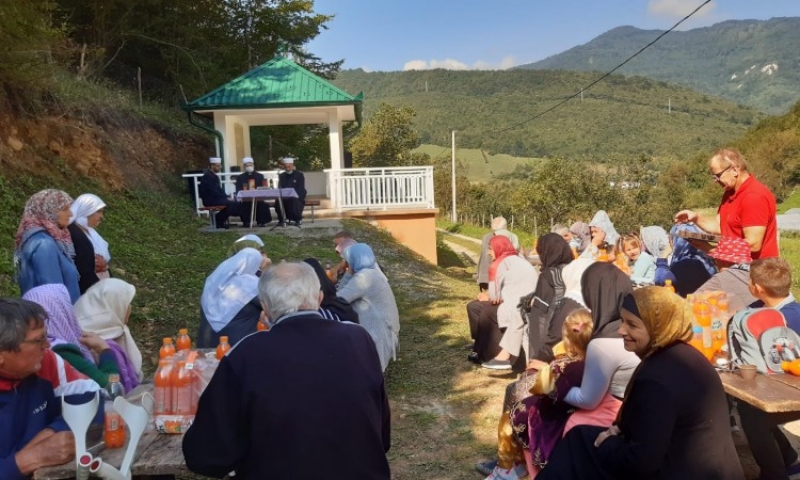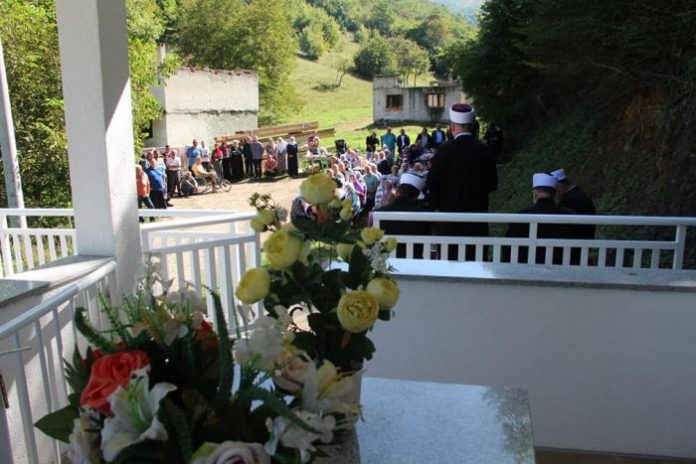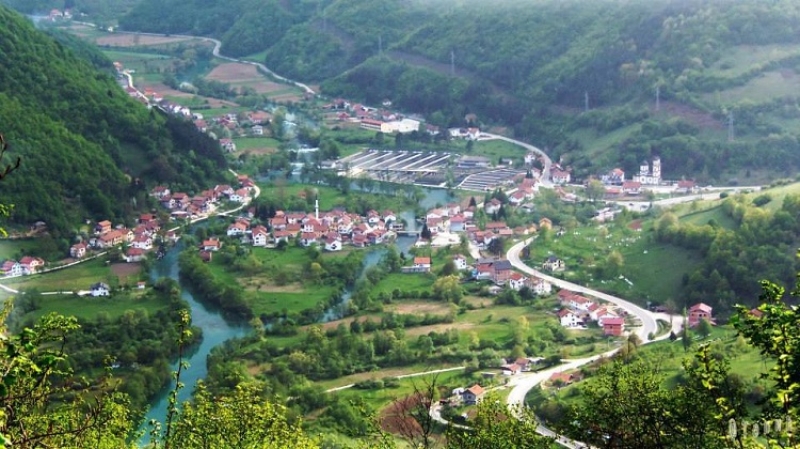Written by: Izet Perviz
The Yugoslav People's Army attacked the municipality of Jajce on March 21, 1992. Thus, in the book Crimes against Bosniaks in Jajce, Jezera and Šipov 1992–1995, published in 2017 by the Institute for Researching Crimes Against Humanity and International Law of the University of Sarajevo, the Institute for the Islamic Tradition of Bosniaks and the Majlis of the Islamic Community, a group of authors writes: dr. sc. Elvir Duranović, M.Sc. sc. Zilha Mastalić-Košuta, M.Sc. Alma Hajrić-Čaušević, M.Sc. Almir Grabovica and M.Sc. Hikmet Karcic. That day, at 11:15 p.m., an artillery attack was carried out on the outskirts of the municipality of Jajce. The villages of Ljoljići and Čerkazovići were attacked. They will soon find themselves under occupation and six months later there will be a mass shooting of civilians, including women and children, in those villages.
Čerkazović and Ljoljić were in the area of responsibility of the newly established 30th partisan division of the Fifth Corps of the JNA, which was commanded by Stanislav Galić (sentenced later in The Hague to life imprisonment for crimes committed during the siege of Sarajevo, op. a.). "Two days later, a meeting was held with Stanislav Galić in the Ribnjak building. An EC observer was also present at the meeting. Galić justified himself that the attack was carried out by extremists who were not under his command. He demanded that the JNA enter checkpoints in the interior of Jajaj territory. Although Galić's proposal was not accepted, negotiations continued, but without success. Soon, Galić with his division penetrated from the direction of Bravnica and occupied the suburban settlement of Braga, occupied Šedinac and Energoinvest and the entire industrial zone, and by the end of March he had completely blocked the city. Six months later, as a reward for the successful siege of Jajce, he will be appointed commander of the Sarajevo-Romanian Corps of the VRS, and with the same zeal he will suffocate Sarajevo and terrorize its inhabitants for two full years. As a 'reward' for this siege, the Hague Tribunal will sentence him to life imprisonment. He is serving his sentence in Germany.
On the same day that Stanislav Galić was appointed commander of the Sarajevo-Romania Corps, that is, September 10, 1992, the Bosniak residents of Čerkazović and Ljoljić who did not flee to Jajce when Galić attacked them with artillery will be dragged out of their beds and shot. While Galić toasted in Pale with Ratko Mladić (also later sentenced to life imprisonment in The Hague) and staff officers of the Sarajevo-Romanian VRS Corps, Rade Savić, a VRS soldier killed in the attack on Jajce, was buried in Jezera. In one of the judgments of the Court of Bosnia and Herzegovina, we find Jova Jandrić, who immediately after Rado Savić's funeral gathers a group around him for revenge. He is joined by members of the Mrkonjić brigade of the VRS and the reserve unit of the MUP of the RS: Zoran Marić, Mirko Pekez (son of Špirin), Simo Savić, Mirko Pekez (son of Milin), Milorad Savić (son of Ljupkov), Slobodan Pekez, Ilija Pekez, Milorad Savić (son of Đurin) and Blagoje Jovetić.
They hatch a plan to gather the civilian Bosniak population from Ljoljić and Čerkazović, who already had limited freedom of movement and had to report to the roll call every day, and then take them to a place called Tisovac and kill them there. Armed with automatic and semi-automatic rifles, they went to these places near Lake Pliva and drove Bosnian civilian men, women and children out of their houses at gunpoint. They gathered them in a place called Osoje. Then, holding guns pointed at them, they forced them to go to Draganovac. Along the way, they insulted and beat them with hands, feet and stocks.
They were stopped at Draganovac. Mirko Pekez (Milin's son) took off his jacket and spread it on the ground in front of them. He ordered them to put all the money, gold, jewelry, watches and other valuables they had with them on his jacket. When they finished, Mirko Pekez (Milin's son) rolled up his jacket with the booty. From Draganovac, they were taken to Tisovac and stopped there again. They ordered them to line up side by side over the edge of the precipice. They obediently did it. Then they opened fire on them and a massacre ensued. 23 people were killed and four were wounded.
The following were killed: Nedžib /Osmana/ Mutić (1936), Šećo /Ibre/ Malkoč (1933), Irhad /Mustafe/ Bajramović (1971), Adnan /Sabahudina/ Zobić (1979), Fikret /Arifa/ Zobić (1956), Fahra /Musle/ Balešić (1928), Faza /Avde/ Balešić (1918), Derviša /Hadže/ Mutić (1933), Mujo /Ibre/ Bajramović (1927), Latif /Muje/ Bajramović (1959), Senad /Omera/ Karahodžić (1968), Ibrahim /Alije/ Karahodžić (1933), Asmer /Nurije/ Zobić (1977), Adis /Nurije/ Zobić (1983), Zarifa /Latifa/ Karahodžić (1927), Đula /Avde/ Zobić (1924), Ramiza /Šerifa/ Mutić (1936), Fikreta /Tahira/ Zobić (1957), Fatima /Huse/ Mutić (1963), Ekrema /Latifa/ Bajramović (1939), Mustafa /Aslije/ Bajramović (1946), Mustafa /Ibre/ Balešić (1950) i Sabahudin /Šemse/ Bajramović (1979). Preživjeli su: Zejna Bajramović, Nurija Zobić, Omer Karahodžić i Mustafa Bajramović.

Justice came fifteen years late. On October 30, 2007, members of SIPA arrested Mirko (Mile) Pekez (1965), Mirko (Špire) Pekez (1966) and Milorad (Ljupko) Savić (1970) in Jezera. The Court of Bosnia and Herzegovina ordered their detention, and on November 28, 2007, it confirmed the indictment of the Prosecutor's Office of Bosnia and Herzegovina. The indictment against Jovo Jandrić and Slobodan Pekez was confirmed on December 9, 2008, and against Zoran Marić, born in Ljoljići, on July 16, 2009. The others, Simo Savić, Milorad (Đure) Savić, Ilija Pekez and Blagoje Jovetić, were no longer among the living. . The main initiator of this crime, Jovo Jandrić, and one of the members of the group, Slobodan Pekez, fled to Serbia. They are still there today. Even from Belgrade, Jovo Jandrić testified by video link in the proceedings against Mirko (Mila) Pekez, Mirko (Špira) Pekez and Milorad Savić. They were brought to the bench of the Court of Bosnia and Herzegovina. All four pleaded not guilty on December 11, 2007. The trial will begin on February 8, 2008. Those who survived the shooting come before the ear of justice, with their terrible story. Omer Karahodžić says: "We all slept that fateful night in the family house in Ljoljići. Deep into the night, a rough male voice wakes us up: 'Get out!' I didn't even have time to get dressed, and Mirko (Mile) Pekez has already climbed upstairs and is chasing his wife, son and brother out."
Omer was shot in the leg and stomach. He testified that he managed to drag himself to a nearby forest. In the evening of the next day, he saw policeman Bora, whom he knew to be a good man, so he contacted him. Boro gave him water and transferred him to the hospital in Šipovo, from where he was transferred to Banja Luka. Unrecovered, he was transferred from the hospital in Banja Luka to the Manjača camp, from where he was exchanged on September 30, 1992. After the war, he returned to Jajce, and, as he claims, Mirko Pekez (Spirin's son) came to his home a year before he was to be arrested and asked Omer to confirm that he was not in the group that killed Omer's son, wife, brother and neighbors.

On April 22, 2008, the Court of Bosnia and Herzegovina issued a first-instance verdict: Mirko (Mile) Pekez was sentenced to 29, and Mirko (Špire) Pekez and Milorad Savić to 21 years in prison each. On September 29, 2008, the second-instance panel confirmed the verdict in the part relating to Mirko (Mile) Pekez, and annulled the rest of the verdict and ordered a hearing before the Appellate Panel, which on May 5, 2009 delivered a verdict and sentenced Mirko (Špir) Pekez to 14 , and Milorad Savić to 21 years in prison.
Two months after the confirmation of the verdict against the two Pekez and Milorad Savić, Zoran Marić, who fled to Serbia after the massacre, was also brought before the court. He pleaded not guilty on July 30, 2009, but, while awaiting trial, decided to confess to the crime. He comes to the first hearing of the main trial with a plea agreement. On October 29, 2009, the Court of Bosnia and Herzegovina sentenced him to 15 years in prison.
Four years later, Pekezi and Savić were released from prison. On October 22, 2013, the Constitutional Court of Bosnia and Herzegovina accepted the appeal on the violation of rights and annulled the second-instance verdict. On November 18, 2013, the Court of Bosnia and Herzegovina issued a decision suspending the execution of the sentence for all three. The following month, a new hearing was opened before the Appellate Council, which on December 18, 2013 issued a new second-instance verdict and sentenced Mirko (Špire) Pekez to 10 and Milorad Savić to 15 years, and on January 17, 2014, sent the verdict by which Mirka (Mile) Pekeza is sentenced to 20 years in prison.
Jovo Jandrić and Slobodan Pekez are still hiding in Serbia and the hand of justice still eludes them. Čerkazovići and Ljoljići are no longer in the municipality of Jajce, but in the municipality of Jezero, which belonged to the RS, an entity created by the same atrocities that were committed in these two villages on September 10, 1992.
Source: Stav.ba

(1).png)
(1).png)